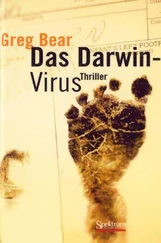Lipton looked down at the desk. “We advised them that their infants were likely to be born with severe defects, and that they would not survive. We referred them to outpatient treatment at their nearest hospitals. We’re picking up all their expenses, even if there are complications. Especially if there are complications. They’re all within the period of efficacy.”
“They’re taking RU-486?”
“It’s their choice.”
“It isn’t policy, Denise.”
“I know that. Six of the women asked for the opportunity. They wanted to abort. At that point, we can’t continue.”
“Did you tell them — ?”
“Kaye, our guidelines are crystal clear. If there’s a judgment that the infants could endanger the mother’s health, we give them the means to terminate. I support their freedom to choose.”
“Of course, Denise, but…” Kaye turned around, examining the familiar office, the charts, the pictures of fetuses at different stages of development. “I can’t believe this.”
“Augustine asked us to hold off giving them the RU-486 until a clear policy could be established. But the head of clinical research calls the shots.”
“All right,” Kaye said. “Who didn’t ask for the drug?”
“Luella Hamilton,” Lipton said. “She took it with her, promised to check in with her pediatrician regularly, but she did not take it under our supervision.”
“It’s over, then?”
“We’ve pulled our finger out of the pie,” Lipton said softly. “We don’t have a choice. Ethically, politically, we’re going to get hit whatever we do. We chose ethics and support for our patients. If it were today, however…We have new orders from the secretary of Health and Human Services. No recommendations to abort and no dispensing of RU-486. We got out of the baby business just under the wire.”
“I don’t have Mrs. Hamilton’s home address or phone number,” Kaye said.
“You won’t get it from me, either. She has a right to privacy.” Lipton stared at her. “Don’t go outside the system, Kaye.”
“I think the system is going to eject me any minute now,” Kaye said. “Thanks, Denise.”
On the train to Albany, surrounded by the musty smells of passengers, sun-warmed fabric, disinfectant, plastic, Mitch sank into his seat. He felt as if he had just escaped from Wonderland. Daney’s enthusiasm for bringing a “new person” into the family both fascinated and frightened him. The human race had grown so cerebral, and had assumed so much control of its biology, that this unexpected and ancient form of reproduction, of creating variety in the species, could be stopped in its tracks, or engaged in as if it were some kind of game.
He stared out the window at small towns, forests of young trees, bigger towns with gray expanses of warehouses, factories dull and dirty and productive.
61
Americol Headquarters, Baltimore
Kaye picked up the papers she had ordered from Medline through the library, twenty copies each of eight different papers, all neatly collated. She shook her head and skimmed one of the folios as she boarded the elevator.
She took an additional five minutes going through the security checkpoints on the tenth floor. Agents waved wands, scanned her photo ID, and then passed sniffers over her hands and purse. Finally, the head of the vice president’s Secret Service detail asked for someone inside the executive dining room to vouch for her. Dicken emerged, said that he knew her, and she entered the dining room fifteen minutes into the meeting.
“You’re late,” Dicken whispered.
“Caught in traffic. Did you know they’ve ended the special study?”
Dicken nodded. “They’re dancing around each other now, trying to avoid making any commitments. Nobody wants to take the blame for anything.”
Kaye saw the vice president sitting near the front, the science advisor beside him. The room held at least four Secret Service agents, which made her glad Benson had stayed outside.
Soft drinks, fruit, crackers, cheese, and vegetables had been set out on a table at the back, but no one was eating. The vice president clutched a can of Pepsi.
As Dicken led Kaye to a folding chair on the left side of the room, Frank Shawbeck finished a briefing on the findings of the NIH studies.
“That took just five minutes,” Dicken whispered to Kaye.
Shawbeck tapped his papers on the lectern, stepped aside, and Mark Augustine walked forward. He leaned on the lectern.
“Dr. Lang is here,” he announced neutrally. “Let’s move on to social issues. We have suffered twelve major riots across the U.S. Most seem to have been triggered by announcements that we are going to pass out free RU-486. No such plans were ever completed, but they were of course under discussion.”
“None of these drugs are illegal,” Cross said irritably. She sat to the right of the VP. “Mr. Vice President, I invited the senate majority leader to attend this meeting, and he declined. I will not be held responsible for—”
“Please, Marge,” Augustine said. “We’ll air our grievances in a few minutes.”
“Sorry,” Cross said, and folded her arms. The vice president glanced over his shoulder, surveyed the audience. His eye fell on Kaye and he seemed troubled for a moment, then turned again to face front.
“The U.S. is not alone in having to deal with civil unrest,” Augustine continued. “We’re heading toward a social disaster of major proportions. Plainly speaking, the general public does not understand what is going on. They react according to gut instincts, or according to the dictates of demagogues. Pat Robertson, bless him, has already recommended that God blast Washington, D.C., with Hell’s hottest fires if the Taskforce is allowed to go ahead with RU-486 testing. He’s not alone. There’s a real likelihood that the public will knock around until they find something, anything, more palatable than the truth, and then they’ll flock behind that banner, and it’s likely to have a religious aspect, and science will go right out the window.”
“Amen,” Cross said. Nervous laughter rippled through the small audience. The VP did not smile.
“This meeting was scheduled three days ago,” Augustine continued. “The events of yesterday and today make it even more urgent that we keep our ducks in a row.”
Kaye thought she could see where this was going. She looked for Robert Jackson and located him seated behind Cross. He angled his head, and his eyes swung left for the briefest moment, looking right at her. Kaye felt her face grow hot.
“This is about me,” she whispered to Dicken.
“Don’t be arrogant,” Dicken warned. “We’re all here to eat a little crow today.”
“We’re already tabling the research on RU-486 and what has very loosely, and in very bad taste, been labeled RU-Pen-tium,” Augustine said. “Dr. Jackson.”
Jackson stood. “Preclinical trials show no efficacy by any of our vaccines or ribozyme inhibitors against newly located strains of SHEVA, loosely referred to as SHEVA-X. We have reason to believe that all new incidents of Herod’s in the last three months can be attributed to lateral infection by SHEVA-X, which may come in at least nine different varieties, all with different coat glycoproteins. We can’t target the LPC messenger RNA in the cytoplasm because our current ri-bozymes do not recognize the mutated form. In short, we’re dead in the water on a vaccine. We probably won’t come up with alternatives for six more months.”
He sat down again.
Augustine pressed his fingers together symmetrically, making a flexible polygon. The room was silent for a long interval, absorbing the news and its implications. “Dr. Phillips.”
Читать дальше
Конец ознакомительного отрывка
Купить книгу












